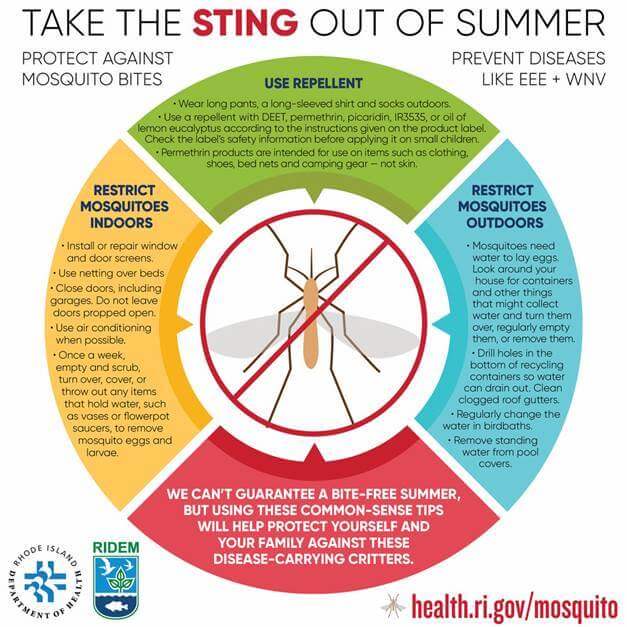

PROVIDENCE, RI – State health and environmental officials report one mosquito sample collected Sept. 19 from a trap set in Central Falls has tested positive for West Nile Virus (WNV), the 13th in RI ranging from its southern to northern borders.
RIDOH State Health Laboratories confirmed the finding after testing 167 mosquito samples collected from 40 traps set statewide by DEM on Sept. 17 and Sept. 19. All other samples tested negative for WNV and Eastern Equine Encephalitis (EEE) virus, including the remaining 97 samples pending testing at the time of last week’s report from traps set on Sept. 12 and Sept. 14.
To date, Rhode Island reports six positive EEE virus mosquito samples: five in Glocester and one on Block Island, one EEE case in a mammal (a donkey in Glocester that was announced Sept. 7), and 13 WNV findings: six in Westerly, two in Barrington, and one each in Central Falls, Cranston, Johnston, Richmond, and Tiverton.
Massachusetts reports 23 EEE virus findings in mosquitoes, 159 WNV findings, and three human cases of WNV. It is notable that EEE virus has now been detected in several towns in Bristol County, Massachusetts, which border Rhode Island’s East Bay communities. The State of Connecticut is reporting 49 EEE virus findings, 180 WNV findings, and two human WNV cases. The significant EEE virus activity on the borders of Massachusetts and Connecticut indicates a higher risk in Rhode Island. Earlier this month, DEM announced that it has temporarily closed state-owned recreational areas in Glocester, including the George Washington State Campground, Durfee Hill and George Washington Management Areas, and Pulaski State Park until further notice to protect the health and safety of visitors and staff.
WNV is the leading cause of mosquito-borne disease in the continental United States and is much more prevalent than EEE. Cases of WNV occur during mosquito season, which starts in the summer and continues through fall. There are no vaccines to prevent or medications to treat WNV in people. Fortunately, most people infected with WNV do not feel sick. About one in five people who are infected develop a fever and other symptoms. About one out of 150 infected people develop a serious, sometimes fatal, illness. DEM and RIDOH advise Rhode Islanders to reduce their exposure to mosquitoes until the first hard frost. (A hard frost is when the air and the ground freeze below 32°F for three hours or below 28°F for two hours.)
Asian Tiger Mosquito: Prevalent in RI
The Asian Tiger Mosquito has become prevalent in Rhode Island urban environments, and it has become common again this season. It is notable as a daytime biter encountered in shaded backyards. It has a striking black and white pattern evident to the naked eye. It develops from eggs laid in artificial containers, so residents are urged to remove standing water from containers such as buckets, pots, wheelbarrows, boats, and pools. Clogged rain gutters and puddles formed on tarps also can support the larvae of this species. The Asian Tiger Mosquito is known to transmit several diseases, including WNV.
Protect yourself from West Nile Virus
- Put screens on windows and doors. Fix screens that are loose or have holes.
- At sunrise and sundown (when mosquitoes that carry EEE are most active), consider rescheduling outdoor activities that occur during evening or early morning. If you must be outside, wear long-sleeved shirts and long pants and use bug spray.
- Use EPA-approved bug spray with one of the following active ingredients: DEET (20-30% strength); picaridin, IR3535; and oil of lemon eucalyptus or paramenthane. Always read the label and follow all directions and precautions.
- Do not use bug spray with DEET on infants under two months of age. Children should be careful not to rub their eyes after bug spray has been applied on their skin. Wash children’s hands with soap and water to remove any bug spray when they return indoors.
- Put mosquito netting over playpens and baby carriages.
Remove mosquito breeding grounds
- Remove items around your house and yard that collect water. Just one cup of water can produce hundreds of mosquitoes; an unused tire containing water can produce thousands of mosquitoes.
- Clean your gutters and downspouts so that they can drain properly.
- Remove any water from unused swimming pools, wading pools, boats, planters, trash and recycling bins, tires, and anything else that collects water, and cover them.
- Remove or treat any shallow water that can accumulate on top of a pool cover. Larvicide treatments, such as Mosquito Dunks can be applied to kill immature mosquitoes. This environmentally friendly product is available at many hardware and garden stores and online.
- Clean and change water in birdbaths at least once a week.
Best anti-mosquito practices for horse owners
Horses are particularly susceptible to WNV and EEE. Horse owners are advised to vaccinate their animals early in the season and practice the following:
- Remove or cover areas where standing water can collect.
- Avoid putting animals outside at dawn, dusk, or during the night when mosquitoes are most active.
- Insect-proof facilities where possible and use approved repellents frequently.
- Monitor animals for symptoms of fever and/or neurological signs (such as stumbling, moodiness, loss of appetite) and report all suspicious cases to a veterinarian immediately. If you are unsure if your horse is properly vaccinated, you should consult with your veterinarian.
Visit health.ri.gov/mosquito for additional mosquito prevention tips, videos, and local data. DEM and RIDOH also remind Rhode Islanders to take precautions to avoid mosquito bites when traveling to Zika-affected countries.
This is a test
